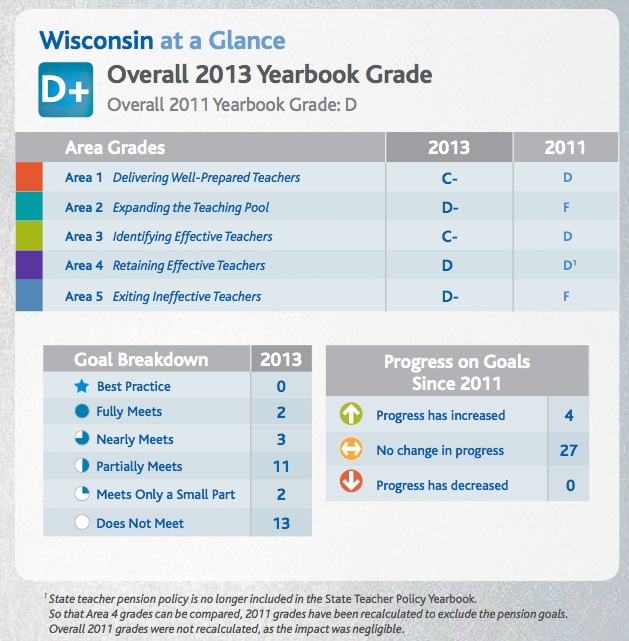
National Council on Teacher Quality (PDF):
1. The state should require teacher candidates to pass a test of academic proficiency that assesses reading, writing and mathematics skills as a criterion for admission to teacher preparation programs.
2. All preparation programs in a state should use a common admissions test to facilitate program comparison, and the test should allow comparison of applicants to the general college-going population. The selection of applicants should be limited to the top half of that population.
Wisconsin requires that approved undergraduate teacher preparation programs only accept teacher can- didates who have passed a basic skills test, the Praxis I. Although the state sets the minimum score for this test, it is normed just to the prospective teacher population. The state also allows teacher preparation programs to exempt candidates who demonstrate equivalent performance on a college entrance exam.
Wisconsin also requires a 2.5 GPA for admission to an undergraduate program.
To promote diversity, Wisconsin allows programs to admit up to 10 percent of the total number of students admitted who have not passed the basic skills test.
RECOMMENDATION
Require all teacher candidates to pass a test of academic proficiency that assesses reading, writing and mathematics skills as a criterion for admission to teacher preparation programs.
Even though the state’s policy that permits programs to admit up to 10 percent of students who have not passed the basic skills test is part of a laudable goal to promote diversity, allowing this exemption is risky because of the low bar set by the Praxis I (see next recommendation).
Require preparation programs to use a common test normed to the general college-bound population.
Wisconsin should require an assessment that demonstrates that candidates are academically com- petitive with all peers, regardless of their intended profession. Requiring a common test normed to the general college population would allow for the selection of applicants in the top half of their class, as well as facilitate program comparison.
Consider requiring candidates to pass subject-matter tests as a condition of admission into teacher programs.
In addition to ensuring that programs require a measure of academic performance for admission, Wisconsin might also want to consider requiring content testing prior to program admission as opposed to at the point of program completion. Program candidates are likely to have completed coursework that covers related test content in the prerequisite classes required for program admis- sion. Thus, it would be sensible to have candidates take content tests while this knowledge is fresh rather than wait two years to fulfill the requirement, and candidates lacking sufficient expertise would be able to remedy deficits prior to entering formal preparation.
For admission to teacher preparation programs, Rhode Island and Delaware require a test of academic proficiency normed to the general college- bound population rather than a test that is normed just to prospective teachers. Delaware also requires teacher candidates to have a 3.0 GPA or be in the top 50th percentile for general education coursework completed. Rhode Island also requires an average cohort GPA of 3.0, and beginning in 2016, the cohort mean score on nationally-normed tests such as the ACT, SAT or GRE must be in the top 50th percentile. In 2020, the requirement for the mean test score will increase from the top half to the top third.
via a kind Wisconsin Reading Coalition email:
After receiving a grade of D in 2009 and 2001, Wisconsin has risen to a D+ on the 2013 State Teacher Policy Yearbook released by the National Council on Teacher Quality.
In the area of producing effective teachers of reading, Wisconsin received a bump up for requiring a rigorous test on the science of reading. The Foundations of Reading exam will be required beginning January 31, 2014.
Ironically, Wisconsin also scored low for not requiring teacher preparation programs to prepare candidates in the science of reading instruction. We hope that will change through the revision of the content guidelines related to elementary licensure during a comprehensive review process that is underway at DPI this winter and spring.